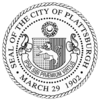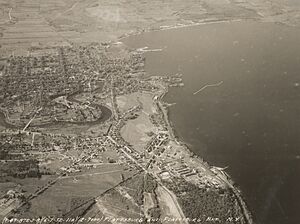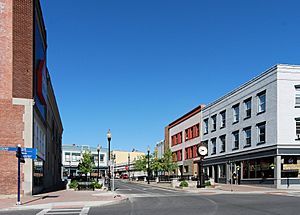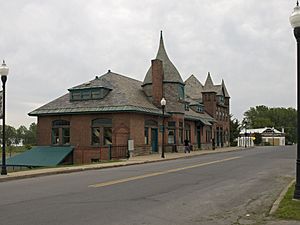Plattsburgh, New York facts for kids
Quick facts for kids
Plattsburgh
|
|||
|---|---|---|---|
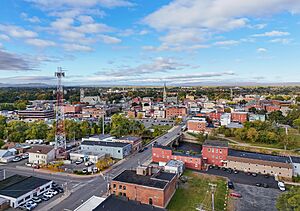
The skyline in 2024
|
|||
|
|||
| Nickname(s):
"The Lake City"
"La Ville sur le Lac" "The Burgh" |
|||
| Motto(s):
Ipsa Sibi Præmium Virtus (in Latin)
Virtue is its own reward |
|||
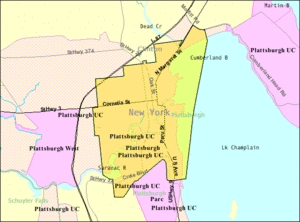
Map of the city
|
|||
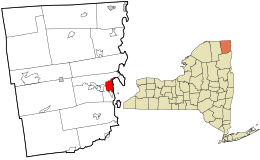
Location in Clinton County and the state of New York.
|
|||
| Country | United States | ||
| State | New York | ||
| Region | The Adirondacks; The North Country | ||
| County | Clinton | ||
| Settled | 1785 | ||
| Incorporated | 1815 (village) 1902 (city) |
||
| Named for | Zephaniah Platt | ||
| Government | |||
| • Type | Mayor–council | ||
| Area | |||
| • Total | 6.59 sq mi (17.08 km2) | ||
| • Land | 5.04 sq mi (13.05 km2) | ||
| • Water | 1.56 sq mi (4.03 km2) 23.4% | ||
| Elevation | 138 ft (42 m) | ||
| Population
(2020)
|
|||
| • Total | 19,841 | ||
| • Density | 3,937.49/sq mi (1,520.42/km2) | ||
| Time zone | UTC−5 (Eastern) | ||
| • Summer (DST) | UTC−4 (EDT) | ||
| ZIP codes |
12901, 12903
|
||
| Area code(s) | 518 | ||
| FIPS code | 36-58574 | ||
| GNIS feature ID | 0960698 | ||
| Website | CityofPlattsburgh-NY.gov | ||
Plattsburgh is a city in New York, located on the northwestern shore of Lake Champlain. It is the main city of Clinton County. In 2020, about 19,841 people lived in the city. When you add the nearby Town of Plattsburgh, the total population for the area is over 31,000.
Plattsburgh is just outside the beautiful Adirondack Park. It is an important center for business in the northern Adirondack Mountains. Long ago, the land around Plattsburgh was home to Native American groups like the Iroquois and Mohawk people. In 1609, Samuel de Champlain was the first European to explore this area.
Plattsburgh played a big part in the War of 1812. It was the site of the Battle of Plattsburgh, a major American victory that helped end the fighting in the northern United States. For many years, Plattsburgh was an important military base. This included Plattsburgh Air Force Base during the Cold War. Today, the former base is a civilian airport and a key area for new businesses.
Contents
- Plattsburgh's Early History
- Important Moments in Plattsburgh's Past
- How Plattsburgh Is Spelled
- Plattsburgh's Geography and Weather
- People in Plattsburgh
- Learning in Plattsburgh
- News and TV in Plattsburgh
- Getting Around Plattsburgh
- Plattsburgh's Economy
- Famous People from Plattsburgh
- Images for kids
- See also
Plattsburgh's Early History
How Plattsburgh Was Founded
Plattsburgh was started by Zephaniah Platt in 1785. He received the land from George Clinton. Platt came from Poughkeepsie, New York. He wanted Plattsburgh to protect American interests in the Saint Lawrence River and Lake Champlain areas. This happened after the Americans won the American Revolutionary War.
Becoming a Village and Then a City
On March 3, 1815, Plattsburgh officially became a village. It was separated from the larger Town of Plattsburgh. The first village elections were held on May 2 of that year. Later, in 1903, the village became a city. The exact borders between the city and the town are still a bit of a mystery!
Important Moments in Plattsburgh's Past
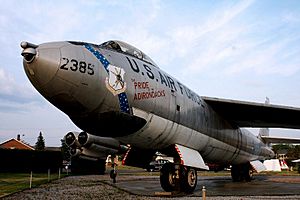
Plattsburgh's location near Lake Champlain and the Canadian border made it important. Many historical events happened here. These include the Revolutionary War's Battle of Valcour Island. Also, the War of 1812's Battle of Plattsburgh was fought here. This battle was the last major fight of the war between British/Canadian and American forces. You can learn more at the War of 1812 museum in the city.
Education in Plattsburgh's History
The Plattsburgh Normal School was started in 1889. It was a school for training teachers. In 1929, the school building burned down. For three years, classes were held in City Hall. In 1932, the college moved to Hawkins Hall. This building became the main part of the modern campus. In 1948, it became State University of New York at Plattsburgh.
Plattsburgh and Baseball
Plattsburgh also had its own minor league baseball teams. The Plattsburgh Brewers played here from 1895 to 1907. Famous baseball player Eddie Collins, who is in the Baseball Hall of Fame, played for Plattsburgh in 1906.
Military Training and the Cold War
In 1915, Plattsburgh became a site for military training camps. These "Plattsburgh camps" trained about 40,000 future United States Army officers. This happened before World War I.
During the Cold War, the military was very important in Plattsburgh. Plattsburgh Air Force Base (PAFB) was a key base for the Strategic Air Command on the East Coast. Its location in the Champlain Valley meant good weather for planes to take off and land. The base had powerful B-52 Bombers and other aircraft. It was one of only four military bases in the U.S. with a runway big enough for a Space Shuttle to land.
In 1961, a missile squadron with 12 Atlas "F" Intercontinental Ballistic Missiles was based here. These missiles were stored in underground silos around Plattsburgh. They played a role during the 1962 Cuban Missile Crisis. The Atlas missiles were later replaced by newer ones and the squadron was deactivated in 1965.
Even though it won many awards, Plattsburgh Air Force Base closed in 1995. This was part of a plan to close bases after the Cold War ended. Now, the former base is used by many businesses and airlines.
Today, Plattsburgh is a popular place for tourists from Montreal and Quebec, Canada. You can even see signs in both English and French around the city. Many new businesses, especially those with Canadian ties, are growing on the old airbase. Companies like Bombardier and Nova Bus build trains and buses here.
How Plattsburgh Is Spelled
Sometimes, you might see Plattsburgh spelled without the "h" as Plattsburg. Many old documents about the 1814 naval battle use the spelling Plattsburg. Because of this, some history books also use that spelling.
In 1950, officials noticed the different spellings. They found that the post office name was changed to Plattsburgh by 1828. But in 1891, it was changed back to Plattsburg. Then, in 1951, it was changed back to Plattsburgh again. The name of the city itself never actually changed.
Even today, some signs, including highway signs and the Amtrak station sign, still say "Plattsburg."
Plattsburgh's Geography and Weather
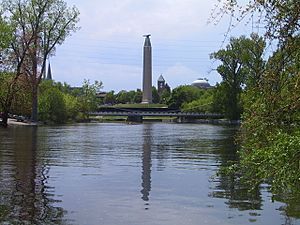
Plattsburgh is located at 44°41′43″N 73°27′30″W / 44.69528°N 73.45833°W. The city covers about 6.6 square miles (17.0 km2). Most of this is land, but about 1.5 square miles (4.0 km2) is water.
The city sits on the western shore of Lake Champlain. This is in the northeastern part of New York. The Saranac River flows through the city and into Lake Champlain.
Plattsburgh's Climate
Plattsburgh has a climate with cold, snowy winters and warm, rainy summers. This type of weather is called a humid continental climate.
| Climate data for Plattsburgh, New York (1991–2020 normals, extremes Nov. 1945–present) | |||||||||||||
|---|---|---|---|---|---|---|---|---|---|---|---|---|---|
| Month | Jan | Feb | Mar | Apr | May | Jun | Jul | Aug | Sep | Oct | Nov | Dec | Year |
| Record high °F (°C) | 64 (18) |
65 (18) |
85 (29) |
93 (34) |
94 (34) |
97 (36) |
99 (37) |
101 (38) |
95 (35) |
87 (31) |
75 (24) |
71 (22) |
101 (38) |
| Mean maximum °F (°C) | 48 (9) |
48 (9) |
61 (16) |
76 (24) |
85 (29) |
91 (33) |
92 (33) |
90 (32) |
86 (30) |
75 (24) |
64 (18) |
52 (11) |
93 (34) |
| Mean daily maximum °F (°C) | 28.2 (−2.1) |
31.0 (−0.6) |
40.0 (4.4) |
54.0 (12.2) |
67.7 (19.8) |
75.4 (24.1) |
80.7 (27.1) |
78.9 (26.1) |
70.7 (21.5) |
57.6 (14.2) |
45.7 (7.6) |
34.1 (1.2) |
55.3 (13.0) |
| Daily mean °F (°C) | 19.1 (−7.2) |
21.0 (−6.1) |
30.2 (−1.0) |
43.5 (6.4) |
56.0 (13.3) |
64.4 (18.0) |
69.9 (21.1) |
67.7 (19.8) |
59.7 (15.4) |
48.0 (8.9) |
37.2 (2.9) |
26.4 (−3.1) |
45.3 (7.4) |
| Mean daily minimum °F (°C) | 10.0 (−12.2) |
11.0 (−11.7) |
20.5 (−6.4) |
33.0 (0.6) |
44.4 (6.9) |
53.4 (11.9) |
59.1 (15.1) |
56.5 (13.6) |
48.7 (9.3) |
38.4 (3.6) |
28.8 (−1.8) |
18.6 (−7.4) |
35.2 (1.8) |
| Mean minimum °F (°C) | −14 (−26) |
−12 (−24) |
0 (−18) |
20 (−7) |
31 (−1) |
41 (5) |
48 (9) |
45 (7) |
34 (1) |
25 (−4) |
13 (−11) |
−6 (−21) |
−17 (−27) |
| Record low °F (°C) | −34 (−37) |
−28 (−33) |
−21 (−29) |
8 (−13) |
25 (−4) |
33 (1) |
40 (4) |
38 (3) |
25 (−4) |
17 (−8) |
−5 (−21) |
−21 (−29) |
−34 (−37) |
| Average precipitation inches (mm) | 1.41 (36) |
1.22 (31) |
1.33 (34) |
2.55 (65) |
2.88 (73) |
4.07 (103) |
3.61 (92) |
3.58 (91) |
3.11 (79) |
3.04 (77) |
2.33 (59) |
1.76 (45) |
30.89 (785) |
| Average precipitation days (≥ 0.01 in) | 10 | 9 | 11 | 12 | 14 | 14 | 13 | 13 | 12 | 13 | 12 | 11 | 146 |
| Source: NOAA | |||||||||||||
People in Plattsburgh
| Historical population | |||
|---|---|---|---|
| Census | Pop. | %± | |
| 1860 | 3,032 | — | |
| 1870 | 5,139 | 69.5% | |
| 1880 | 5,245 | 2.1% | |
| 1890 | 7,010 | 33.7% | |
| 1900 | 8,434 | 20.3% | |
| 1910 | 11,138 | 32.1% | |
| 1920 | 10,909 | −2.1% | |
| 1930 | 13,349 | 22.4% | |
| 1940 | 16,351 | 22.5% | |
| 1950 | 17,738 | 8.5% | |
| 1960 | 20,172 | 13.7% | |
| 1970 | 18,715 | −7.2% | |
| 1980 | 21,057 | 12.5% | |
| 1990 | 21,255 | 0.9% | |
| 2000 | 18,816 | −11.5% | |
| 2010 | 19,989 | 6.2% | |
| 2020 | 19,841 | −0.7% | |
| U.S. Decennial Census | |||
In 2010, there were almost 20,000 people living in Plattsburgh. About 7,600 households were in the city.
Most people in Plattsburgh are White (about 89.88%). Other groups include Black or African American (3.5%), Asian (2.77%), and Native American (0.38%). About 3.4% of the population is Hispanic or Latino.
The average age in the city was 30 years old. About 16.5% of the people were under 18. Many young adults (27.7%) were between 18 and 24, likely due to the colleges.
Learning in Plattsburgh
Plattsburgh is home to two colleges. SUNY Plattsburgh is a public university that is part of the State University of New York (SUNY) system. It has about 5,500 undergraduate students. Clinton Community College is also part of the SUNY system.
For younger students, the Plattsburgh City School District serves kids from kindergarten to 12th grade. About 2,000 students attend five different schools in the district.
News and TV in Plattsburgh
Newspapers
Plattsburgh has a few local newspapers:
- The Clinton County Free Trader Today
- The Plattsburgh Press Republican
- Plattsburgh Burgh
Television
Plattsburgh has two TV stations. WCFE-TV (channel 57) is a PBS station. WPTZ (channel 5) is an NBC station. Plattsburgh is part of a TV market that includes Burlington, Vermont. This means residents can also watch stations from Burlington. People can also watch Canadian TV channels from Montreal, Quebec.
Getting Around Plattsburgh
Plattsburgh is about an hour's drive from Montreal, Canada. Many people travel between the two places. Plattsburgh often calls itself "Montreal's U.S. suburb." New York state and Quebec have a lot of trade, which makes Plattsburgh an important trade center.
Roads
 Interstate 87 goes around Plattsburgh to the west. It connects Montreal with Albany and other cities to the south.
Interstate 87 goes around Plattsburgh to the west. It connects Montreal with Albany and other cities to the south. U.S. Route 9 runs north and south through the city.
U.S. Route 9 runs north and south through the city. New York State Route 3 is an east-west road that ends in the city.
New York State Route 3 is an east-west road that ends in the city. New York State Route 22 is a north-south road that runs near Route 9.
New York State Route 22 is a north-south road that runs near Route 9. New York State Route 314 is a short road that connects to the Grand Isle–Plattsburgh Ferry.
New York State Route 314 is a short road that connects to the Grand Isle–Plattsburgh Ferry.
Trains
Amtrak, the national passenger train system, serves Plattsburgh. The Adirondack train runs daily. It travels between Montreal and New York City.
Ferries
The closest larger American city is Burlington, Vermont. You can reach it by a ferry from Cumberland Head to Grand Isle. This ferry service is provided by the Lake Champlain Transportation Company.
Air Travel
Plattsburgh International Airport uses the runways of the old Plattsburgh Air Force Base. The airport terminal was finished in 2007.
You can fly directly from Plattsburgh to places like Philadelphia International Airport, Fort Lauderdale, and Orlando. Airlines like Contour Airlines, Breeze Airways, and Allegiant Air fly from Plattsburgh.
Many people from Montreal, Quebec use Plattsburgh's airport. It is often called Montreal's American Airport. This is because it is closer for people living south of Montreal than their own airport.
Buses
The city has a bus service called Clinton County Public Transportation (CCPT). It offers bus routes around the city and county. This helps people from nearby towns travel to Plattsburgh. Buses run five days a week, with a shopping shuttle on Saturdays.
For longer trips, Greyhound and Adirondack Trailways offer daily trips. You can travel to Montreal or Albany.
Plattsburgh's Economy
The biggest employers in Clinton County include C.V.P.H. Medical Center, SUNY Plattsburgh, and the Clinton County Government. Large stores like Wal-Mart and Sam's Club also employ many people. Swarovski Lighting is another big employer. SUNY Plattsburgh helps the local economy by about $300 million each year.
Other important companies in the area are:
- ALSTOM Transportation: They build rail-cars.
- Norsk Titanium: They make parts for the aerospace industry using titanium.
- Nova Bus and Prevost: They make busses for the American market.
Famous People from Plattsburgh
- Michael P. Anderson: An astronaut who died in the Space Shuttle Columbia disaster. He was born in Plattsburgh.
- Jean Arthur: A famous comedy actress from the 1930s and 1940s.
- Rockwell Blake: A world-famous opera singer.
- Jesse Boulerice: A retired NHL hockey player.
- Tom Chapin: A Grammy Award-winning singer-songwriter who went to State University of New York at Plattsburgh.
- Lucretia Davidson: A talented poet who wrote before she passed away at age 16.
- John Henry Hopkins Jr.: The author of the Christmas carol "We Three Kings".
- John White Moore: A Rear Admiral in the United States Navy.
- Bryan O'Byrne: An actor who grew up in Plattsburgh.
- Roman Phifer: A former NFL linebacker.
- David Allen Sibley: A well-known author and expert on birds.
- David A. Stafford: A Brigadier general in the United States Marine Corps.
- Daniel Stewart: The first openly gay elected mayor in New York State history.
- Roy Stone: A Brigadier General in the United States Army.
- Rick Tuttle: A Freedom Rider and politician.
- Kent Vaccaro: A racing driver.
- Karen Wetterhahn: A chemistry professor who studied toxic metals.
- John Lloyd Young: A Tony Award winner who played Frankie Valli in Jersey Boys.
Images for kids
-
Location in Clinton County and the state of New York.
See also
 In Spanish: Plattsburgh para niños
In Spanish: Plattsburgh para niños



